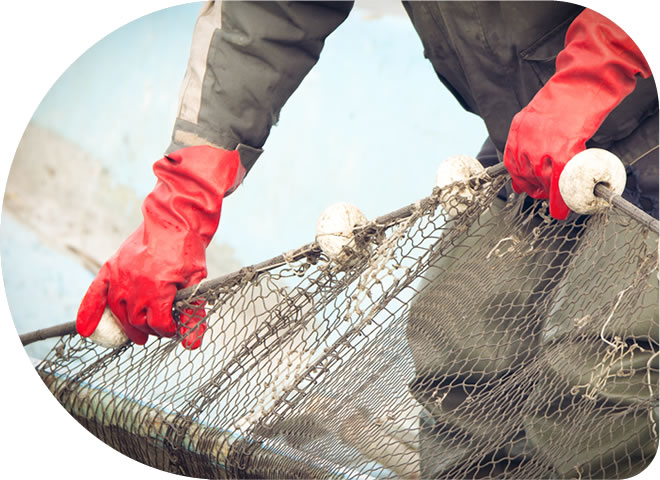Responsible Seafood Management
RS Standards works with the Seafood and Ports sectors on a number of assurance and certification initiatives.
For over twenty years we have been at the forefront of national and international supply chain assurance programs. Our unrivalled knowledge and expertise has been instrumental in the development of standards and certification schemes covering every seafood sector, from fishing ports, responsible fishing, fisheries management, and aquaculture through to marine ingredients, seaweed and production and processing.
The RS team are experts in seafood traceability, product and process integrity and environmental and social impact.Traceability is so important in the seafood sector because it is vital for food safety, proof of legality and verification of responsible fishing and sustainability claims. Issues relating to illegal fishing, crew welfare and mislabelling have become more prominent and traceability is the key to identification and mitigation.
Examples of RS activity
Development of seafood assurance digital portal
Development of seafood processing standards
Management support of certification schemes
National training needs benchmark analysis
Social standard impact review

RS Standards can also help you build resilience against the hazards that impact health, welfare, productivity and the supply of safe, high quality, nutritious seafood.
The primary production and processing sectors need ‘context appropriate’ and practical standards that can stand up to scrutiny and high integrity benchmarking. The RS team are global standards and assurance experts and have assisted in the creation of leading edge standards. As an example our team have had key support roles within the following national and international assurance programs connecting us with an array of direct and indirect clients:
- Responsible Sourcing and Production of Marine Ingredients (MarinTrust- Global)
- BIM Responisble Sourcing Standard (Fishing Vessels)
- Responsible Fishing Vessel Standard (GSA- Global)
- Certified Seafood International (Global)
- Best Seafood Practices Standards (GSA)
- FairTrade USA
- Organic Aquaculture (Canada and EU)
- Label Rouge and other Product Quality Standards (Global)
- Chain of Custody and Traceability Verification (Global)
- Responsible Plastic Management Standards
- Coordinated Local Area Management Systems

The RS team is composed of aquaculture, fisheries and supply chain experts with accreditation, certification and subject matter expertise. We are typically engaged by organisations that want or need to show leadership for product, service or program integrity.
GDST - This multi stakeholder initiative has released traceability standards and expectations that are rapidly gaining industry adoption and market support around the world. The relevance of GDST to emerging regulations is becoming increasingly clear. RS Standards can act as a coach for organisations that are seeking to evaluate their systems against the GDST Framework and help clients make any relevant and necessary improvements. GDST standards could illustrate the “new normal” of seafood traceability for the entire sector.
PAS 1550 - This is a voluntary code of practice developed collaboratively in 2017 by seafood industry representatives and environmental groups. Its aim is to help industry assess and mitigate the risks posed by IUU fishing in their supply chains. It provides recommendations for exercising due diligence to assess and minimise the risk of illegally caught seafood in the supply chain, and to ensure robust traceability of seafood products and decent working conditions in the seafood industry. RS Standards are experts in this standard and can assist organisations to benchmark their progress as is required by the WWF Basket framework in collaboration with leading UK retailers.
Responsible Fishing - there are a number of responsible fishing standards in operation across the globe. These include RFVS, Fish Crew, RSS Sourcing, FairTrade. The standards can range in scope and complexity. RS Standards has helped to develop some of the leading standards and advised on others. We have practical experience assisting markets, fishers and fishing groups to ascertain which is the best standard and assisting with the journey to meet the standards.
We have unrivalled competence, confidence and experience in Sustainability, Traceability and Product Integrity Standards and our clients engage us for development, benchmarking, training and consulting services.
Please review our services and feel free to contact us for an initial discussion.



